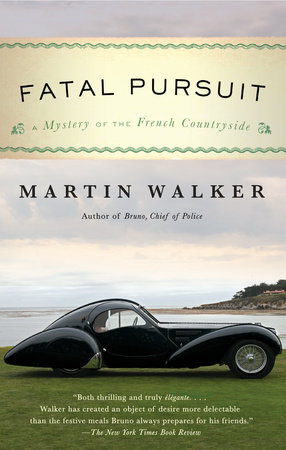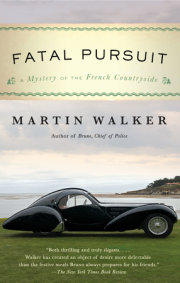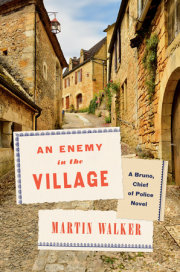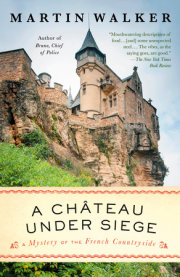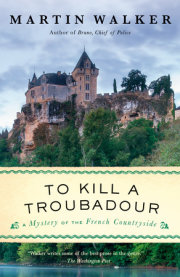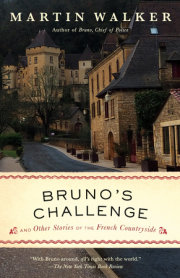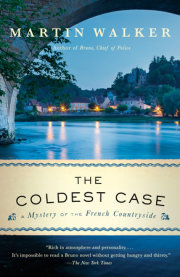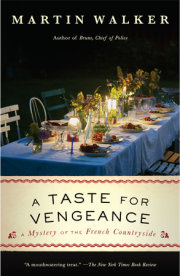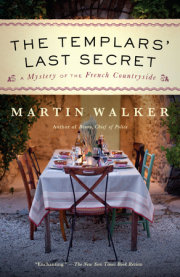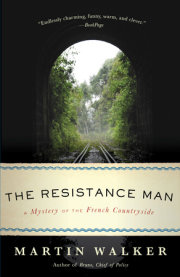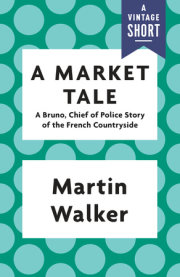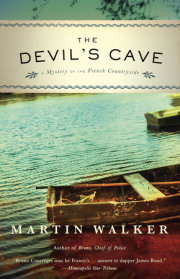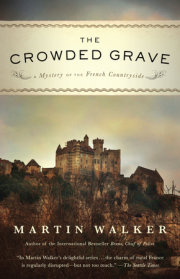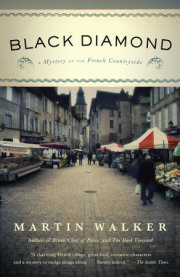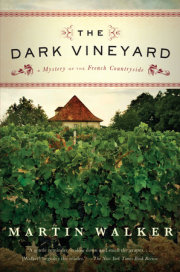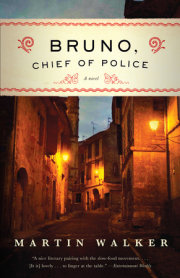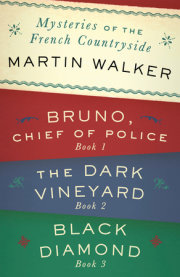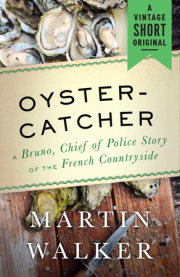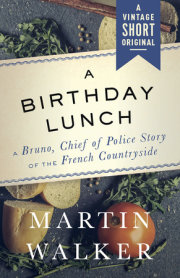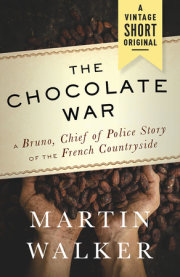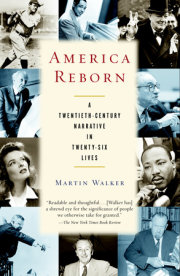1
The lunar calendar said that the new moon made this a good day to plant broccoli, lettuce and cauliflower, just as the previous days of a waning crescent moon were said to be the time to weed and to start a new compost heap. As Bruno Courrèges, chief of police of the small French town of St. Denis, planted the seedlings he’d brought from his greenhouse, he wondered if this was some old wives’ tale. Other gardeners he knew and trusted, prime among them the mayor of St. Denis, swore that the traditional ways of the lunar calendar worked for them, and there was no arguing with the quality of the generous crops they harvested. So when the mayor had given him a copy of the lunar almanac and advised him to try following its advice, Bruno thought he’d make the experiment. At the far side of his vegetable patch, his basset hound, Balzac, gazed at Bruno curiously, probably wondering why he was not allowed to play in this part of the garden.
“There is some science behind it,” the mayor had insisted. “It’s like the tides of the sea. The moon’s gravity draws up the moisture in the soil when it’s waxing and lets it down again when it’s waning. So plant your aboveground vegetables when it’s a waxing moon and your belowground ones when it’s waning. It works for me.”
The last of the seedlings planted, Bruno used his watering can to sprinkle the neat rows of fragile green shoots and then stretched to ease his back, turning his face to the early morning sun. He’d picked the last of his winter vegetables when the moon had said the time was ripe, and some of them were already in the big stockpot he kept atop his wood-burning stove. Cooking a couple of quartered chickens with the carrots, onions and potatoes had made a plain but filling meal for his friends the previous evening. Now with some more vegetables and garlic and a pack of green lentils added, it would provide him and his dog with a hearty stew throughout the week.
Back in the house, Bruno heard his guests moving around upstairs in the new bedroom he’d built under the roof. He added some logs from his woodpile to the stove, closed the damper and then reopened it a notch. It would keep the place warm all day and let the stockpot cook slowly, the way he liked it. He poured the last of the previous evening’s wine into the stew and added some hot water.
He wanted to clean his Land Rover and get to the tennis club early for the meeting and subsequent parade of classic cars, a new event in the calendar of St. Denis. His houseguests would get there on their own. Despite the work he had put into organizing the event, Bruno had never thought of himself as a car enthusiast. He did not read car magazines, and he seldom recognized the make of a new car until he saw its insignia. He put fuel in one end of his own vehicles and water in the other and expected them to function; they were merely tools to take people or goods from one place to another. He entrusted their repair and maintenance to experts and assumed they would be more or less efficient. He had driven many different vehicles, military and civilian. These days he mostly drove the utility police vans supplied to him by his employer, the mayor and council of St. Denis, or the aged Land Rover he had inherited from a hunting friend and for which he had developed a surprising affection.
The Land Rover was not a comfortable vehicle to drive, built before the modern conveniences of adjustable seats, power steering and antilock brakes. Indeed, it was nearly twenty years older than Bruno. He had been surprised to learn this qualified it as a classic car. But it could go just about anywhere—cross rivers, climb the steepest and most muddy slopes and negotiate the most-rock-strewn trails through the woods where he hunted the region’s abundant game. And it had never let him down. This was more than he could say for some of the fancy cars his friends drove, which seemed to require the skills of a computer expert as much as a traditional car mechanic. In his days in the French army, Bruno had driven jeeps, trucks, motorcycles and even the occasional armored car. He had a painful memory of the deafening and bone-shaking experience of driving an AMX-30, France’s main battle tank, on the testing grounds at Saumur and had vowed never to repeat it. Forty tons was more than Bruno felt he could handle, particularly when the instructor had closed the driver’s hatch so that Bruno’s vision was limited to two narrow slits and a blurry periscope. Driving held little appeal for him ever since.
Bruno took little pleasure in driving fast and had been called to the scene of too many road accidents to push his limited skills. He had once been taken frighteningly fast around a course by a skilled rally driver, his friend Annette, a magistrate in Sarlat. She had skidded around bends, missed trees by inches and accelerated over the crests of hills in a way that Bruno’s head repeatedly slammed against the roof of her specially equipped Peugeot. Bruno thought he had been saved from unconsciousness only by the helmet she had supplied. Such driving was not for him. Bruno’s sole ambitions as a driver were to be competent and safe.
This morning Bruno skipped his usual morning run so that he could wash and polish the Land Rover. He had scrubbed the mud from the wheel wells and used a touch-up pen to cover the deeper scratches in the faded-green paint. He had wiped clean the canvas-covered seats and washed the windows, inside and out. He had swept out the dust and gravel from the interior. He had tidied up the rear, putting his tennis gear in one bag, his rugby boots and tracksuit in another and his all-weather garments and hunting clothes in a third.
He had washed the dog blanket that now nestled between the bags, where Balzac could rest while waiting for his master. A newly washed bowl and fresh water bottle stood ready for Balzac’s refreshment. When Bruno drove, Balzac preferred to ride on the passenger seat where he could watch the road and landscape and, in the absence of a car radio, listen to Bruno sing. Other than his occasional attendance at church or on convivial evenings at the rugby club, Bruno had sufficient regard for the comfort of his fellow humans to reserve his singing for his Land Rover and his shower.
As Bruno, freshly showered and changed, drove into town, Balzac seemed to appreciate his owner’s version of “Que Reste-t-il de Nos Amours?” Bruno tried to catch the breathy, almost-playful tones of the Charles Trenet 1943 original. For Bruno, no other version would do, although most French singers had made their own recordings, singing it too slowly or making it too sad, Bruno thought. His own mood when he thought of his past love affairs was of fond nostalgia rather than tragic loss. The memories made him grateful rather than despondent, so as Bruno pulled his unusually clean and gleaming car into the parking lot by the tennis club, he was pleased to see a familiar ancient Citroën deux-chevaux.
Pamela, its owner and the woman who had recently ended their affair, was standing nearby and admiring the baron’s venerable 1958 Citroën DS, which still looked more modern than most of the vehicles on the road. The baron was leaning with one elbow on the roof of his car as he chatted with Pamela and gestured proudly at his second car, the old French military jeep that he used for hunting. It was being driven today by Sergeant Jules from the gendarmerie. Pamela waved and beckoned Bruno to join them as he let Balzac jump out of the car and scamper across to her. He waved back but went to greet his two houseguests, who had followed in their own car, and led them across the parking lot to meet his friends.
It was a fine turnout for the classic-car meeting, thought Bruno proudly, and a very international gathering. His English friend Jack Crimson was at the wheel of his white Jaguar Mark 2, his daughter, Miranda, beside him. Horst, a German archaeologist, was dressed for the part, wearing white gloves and a flat cap as he helped Clothilde, curator of the local prehistory museum, from the seat of her Porsche Speedster. A retired Dutch architect had brought his boxy DAF Variomatic, and someone else had an elderly Saab. Lespinasse from the garage was dusting his perfectly restored Citroën traction-avant from 1938, which was the oldest car of the gathering. To Bruno’s eye the most striking vehicle was a white E-type Jaguar. From its passenger seat Annette was waving at him, a good-looking and fair-haired stranger at the wheel beside her.
“Meet George Young, an English friend,” Annette said to Bruno as he approached, her hand on the young man’s arm. “He’s from London, where he runs a company bringing British drivers over to take part in French rallies and races. I met him at the Rallye des Remparts in Angoulême, and I persuaded him to bring his Jaguar to St. Denis for our parade. He’s going to navigate for me at the rally tomorrow.”
Her voice was animated, almost giddy, and she turned back with a shyly affectionate look at her companion as the two men shook hands, and then Bruno introduced his two guests from Alsace. It was about time Annette found herself a boyfriend, thought Bruno. The Englishman looked very suitable. He was about Bruno’s height, slim but with powerful shoulders and a friendly smile. His French was fluent as he chatted to the couple from Alsace about his visit—he called it a pilgrimage—to the Bugatti collection at the Musée National de l’Automobile in Mulhouse, near their home.
From the corner of his eye, Bruno saw movement in the woods behind the tennis club and recognized a sullen, skinny teenager named Félix lurking in the trees. Félix was a truant who shunned the tennis and rugby lessons Bruno offered to the other students in the town’s collège. He was the youngest child of two parents now well into in their fifties. The older siblings had long since left home, and the father had been unemployed for years. His mother, from a French island in the Caribbean, was a cleaning woman at the school. She had bequeathed to her son a skin just a shade or two darker than café au lait, which meant some cruel schoolmates sneered at him as a métis, a “half-caste.” Félix had suffered a number of brushes with the law for shoplifting, petty vandalism and one case of joyriding in a stolen car. Bruno reminded himself to check on the boy’s age; once he was sixteen, his next offense could mean juvenile detention. Bruno was disappointed that he’d never been able to straighten the boy out; he thought of Félix as one of his failures.
“Him again,” said Yveline, commandant of the small gendarmerie in St. Denis, who had suddenly appeared at Bruno’s side. She was in uniform. “You know we’re going to have a lot of trouble with that kid.”
“We already have,” said Bruno. He gave Félix a stern stare, so the boy would know Bruno had his eye on him, before leading his friends to join a group congregating at a long trestle table set up in front of the club. One of the waitresses from Fauquet’s café was serving croissants and pains au chocolat and dispensing coffee from two large thermoses to the gathering of drivers.
Bruno had chosen this spot for the cars to assemble, away from the main road and out of sight of the crowds who were expected to line the main streets for the parade. He had almost finished his coffee when two strikingly modern cars arrived. Fabiola was at the wheel of her new Renault Zoe electric car, and behind her came Alphonse, the town’s only councillor from the Green Party, in his electric Kangoo van. Alphonse had persuaded the mayor to make a nod to the environment by welcoming electric cars into St. Denis’s first Concours d’Élégance. That was the title Annette had dreamed up for what Bruno thought of simply as a vintage-car parade, one of the events marking the name day of St. Denis on October 9.
Copyright © 2016 by Martin Walker. All rights reserved. No part of this excerpt may be reproduced or reprinted without permission in writing from the publisher.

